I think they are trying to ensure every file ends with a trailing newline character. This is different from ending with a blank line, a.k.a. empty newline.
Edit: As @Easy Angel succinctly clarified in the comments: trailing newline = "\n" and blank line = "\n\n"
I think either:
your lead is either mandating that every file ends with a newline character, but its being misinterpreted as mandating that every file end with a blank line (i.e. an empty line that ends in a newline), or else
they are trying to ensure every file ends with a newline character by actually mandating every file end with a blank line (a.k.a. empty line that ends with a newline), thereby ensuring files ends with at least one newline (and possibly redundant additional newline - overkill?).
Unless the editor actually shows newline symbols, its not always clear in some editors that a file:
- DOES NOT END a newline at all,
- ENDS with a single trailing newline, or
- ENDS with a blank newline, i.e. 2 trailing newlines
I think most modern source code editors insert a trailing newline. However, when using older more general editors, I would always try to ensure my source code files (and text files in general) always ended with a trailing newline (which occasionally came out as a blank line/empty newline depending on the editor I was using) because:
when using cat to display the file on the command line, if the file lacked a trailing newline, the next output (like the shell prompt or a visual delimiter a script may output between files) would end up appearing right after the last non-newline character rather than starting on a newline. In general, the trailing newline made files more user- and script- friendly.
I believe some editors (I can't remember any specifics) would automatically insert a trailing newline if the text file lacked one. This would make it appear like the file was modified. It would get confusing if you have a bunch of files open in different windows and then go to close all of them - the editor prompts you to save but you are unsure whether you made "real changes" to the file or its just the auto-inserted newline.
Some tools like diff and some compilers will complain about a missing trailing newline. This is more noise that users and tools may have to deal with.
Edit:
About editors adding newlines and not being able to see whether there's a newline vs blank newline at the end of the file, I just tested Vim, Eclipse, and Emacs (on my Windows system with Cygwin): I opened a new file, typed 'h' 'e' 'l' 'l' 'o' and saved without hitting [ENTER]. I examined each file with od -c -t x1.
- Vim did add a trailing newline.
- Emacs did add a trailing newline.
- Eclipse did NOT add a trailing newline.
But
- Vim did NOT allow me to cursor down to a blank line under "hello".
- Emacs did allow me to cursor down to a blank line under "hello".
- Eclipse did NOT allow me to cursor down to a blank line under "hello".
Interpret as you like.
My personal practice is to try to ensure text files end with a trailing newline. I just feel there's the least surprise to people and tools with this is the case. I wouldn't treat source files any different from text files in this respect.
Google turns up this:
which, as of this edit, show hits that talk about warnings about a missing trailing newline coming from C compilers, svn (because of diff), diff, etc. I feel there's a general expectation that text files (source files included) end with a trailing newline and least surprising (and less noisy) when they tend to be there.
Finally this is interesting:
Sanitizing files with no trailing newline
Text files should have all their lines terminated by newline characters (ie, \n). This is stated by POSIX, that says that a text file is
A file that contains characters organized into zero or more lines.
A line, in turn, is defined as
* A sequence of zero or more non- characters plus a terminating character.
HOWEVER, all that said, this is just my personal practice. I'm happy to share my opinion to anyone that asks, but I don't foist this on anyone. I don't feel this is something worth mandating, like I say here:
While I'm one whose all for consistency, I'm also against micromanaging every bit of style. Having a huge list of coding conventions, particularly when some of them seem arbitrary, is part of what discourages people from following them. I think coding guidelines should be streamlined to the most valuable practices that improve the -ilities. How much is readability, maintainability, performance, etc improved by mandating this practice?

